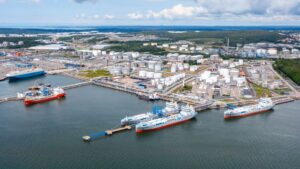More than half of the newly built ships can operate on alternative fuels, a fact that signals the readiness of the shipping sector to decarbonize, Rolf Habben Jansen, CEO of Hapag Lloyd AG, pointed out during his speech at the European Shipping Summit 2023, which took place on 19 and 20 September in Brussels.
Habben Jansen said that the challenge for shipping sector is about ensuring the widespread availability of sustainable fuels, adding that “to facilitate a timely transition in the sector, we also need strong, global regulations that promote fair competition.”
“We’re continually digitizing our processes and investing in our global terminal portfolio, all while setting a bold target: making our fleet carbon neutral by 2045. This journey involves substantial investments in dual-fuel vessels, the usage of alternative fuels, upgrades to our existing fleet, and innovative solutions like our biofuel-based product “Ship Green”, Habben Jansen noted.
“However, to accelerate the energy transition, we must also ensure the right economic and regulatory framework, both to create a level playing field for all players and to secure Europe’s competitiveness. Europe, with its heritage and leadership in shipping, must set the course for the transformation of our industry – while being open to talent from abroad to drive innovation and growth,” Hapag Lloyd’s CEO stated.
Erik Nyheim, the President and CEO of Höegh LNG, also spoke at the European Shipping Summit explaining how post covid and the Ukraine war Europe has changed dramatically, putting new expectations also on shipping.
In his keynote speech, Nyheim emphasized how the shipping community, and particularly the LNG carrier and FSRU segments have been critical in bringing LNG into Europe over the past 18 months. “While LNG used to be ‘nice to have’, it is now an integral and core part of the European energy system”, the chief of Hoegh LNG noted.
Erik Nyheim participated on the summit’s energy security panel together with José Manuel Barosso, former President of the European Commission.
It’s worth noting that the European Shipping Summit brought together European shipowners, the maritime sector and its supply chain, European and international policy makers, NGOs, industry stakeholders, seafarers and maritime workers, including keynote speakers and panel members like Dr. Aaron Farrugia, Minister for Transport, Infrastructure and Capital Projects, in a two-day event featuring a high-level dialogue, brainstorming sessions and workshops.
During his intervention, Minister Farrugia underlined the strategic importance of the Maritime industry which Europe cannot afford to overlook, the importance of the shipping industry which contributes 15% of Malta’s GDP, and the competitive edge which the European Union has with owning 40% of the current global shipping fleet.



